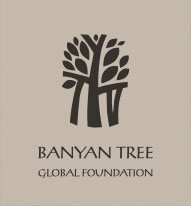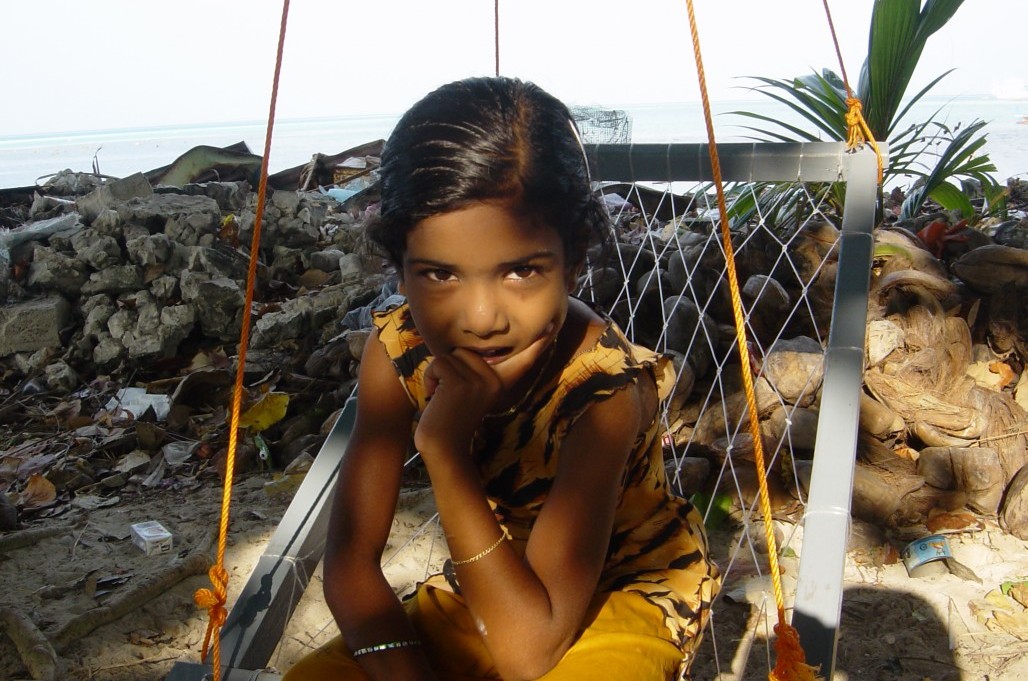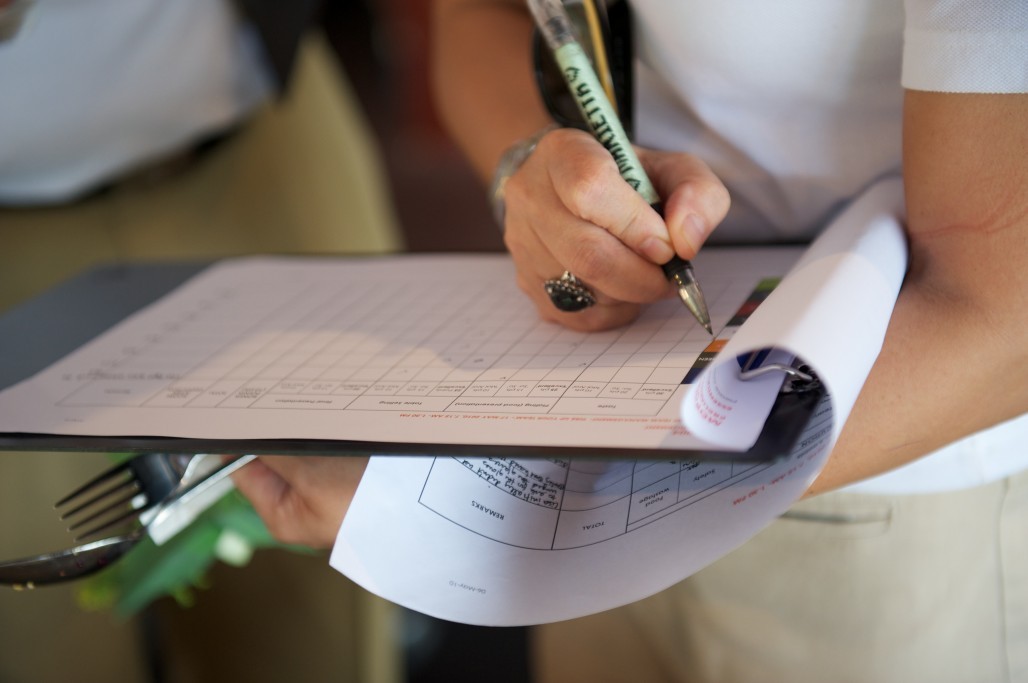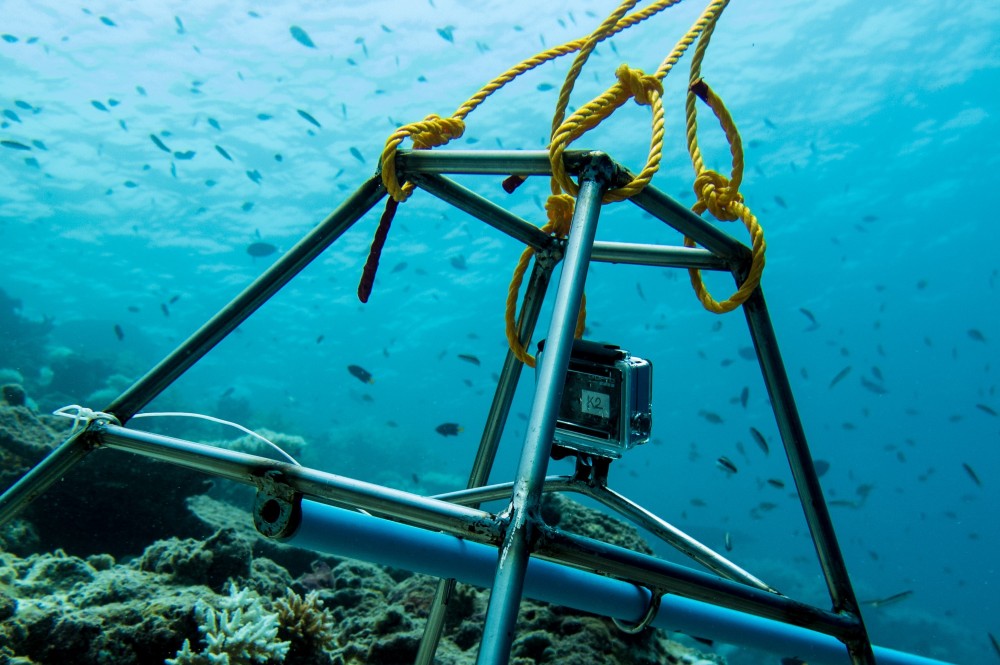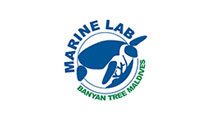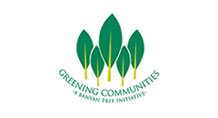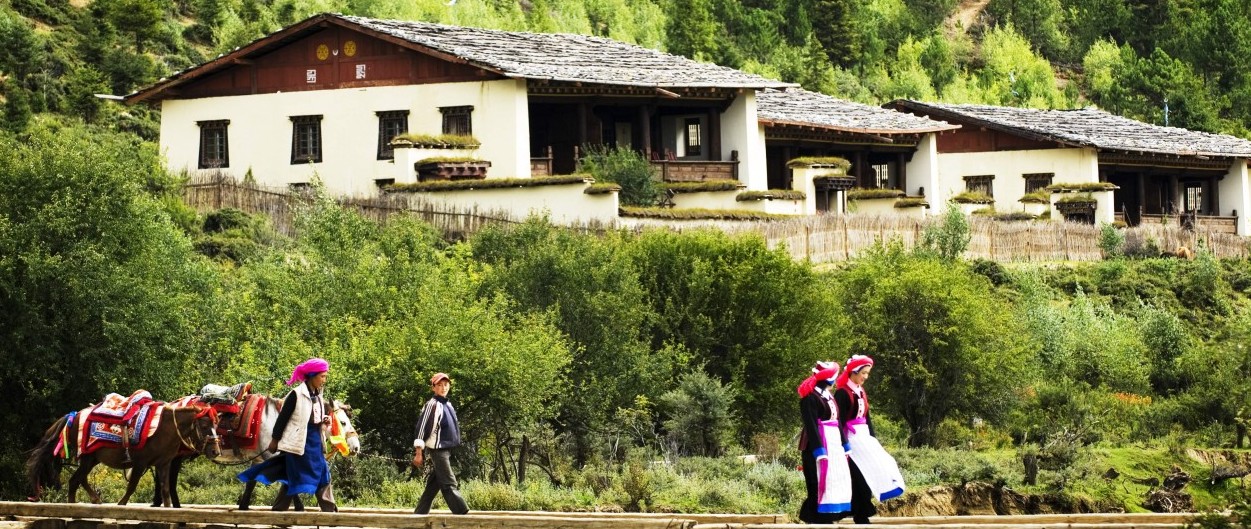
Stay for Good
Since the Group’s genesis of remediating an old disused tin mine into a veritable haven in Bang Tao Bay, Banyan Tree has been committed to sustainable tourism development.
Simply by staying at Banyan Tree, Angsana, Cassia or Dhawa resorts, guests contribute to supporting social and environmental efforts in the region and globally.
Hotel efforts span the spectrum from passive support to active in hopes of inspiring guests to become fully engaged in sustainability.
Our Three Core Pillars of Sustainability
Tourism often depends on natural heritage, areas of aesthetic beauty and high biodiversity. Tourism should therefore encourage stewardship, the responsibility to safeguard the environment and improve resilience in the face of unprecedented global change.
Banyan Tree’s efforts connect with the issue of global climate action by conserving resources through efficient operations, with external assurance by EarthCheck, the leading benchmarking certification within the travel and tourism industry.
We follow a science-based approach to the conservation of sensitive ecosystems and threatened species. This supports positive action and engagement from our associates, guests and community members, connecting people to destinations and driving stewardship.


This image taken on our house reef at Banyan Tree Vabbinfaru in the Maldives, is iconic of the 2016 Global Coral Bleaching Event that impacted coral reefs worldwide. Coral bleaching is a direct result of rising sea temperatures, caused by global climate change.
Tackling climate change is essential for sustainable development and poverty eradication, and a critical component of Banyan Tree’s sustainability efforts.
Banyan Tree’s actions on climate change are integrated throughout environmental, social and governance sustainability efforts, in alignment with the World Travel and Tourism Council’s (2015) call to connect with global climate action:

Integrate |
climate change and related issues into business strategy |

Support |
the global transition to a low carbon economy through emission reductions |

Recognise |
the value of cultural and natural heritage and strengthening local resilience where we operate |
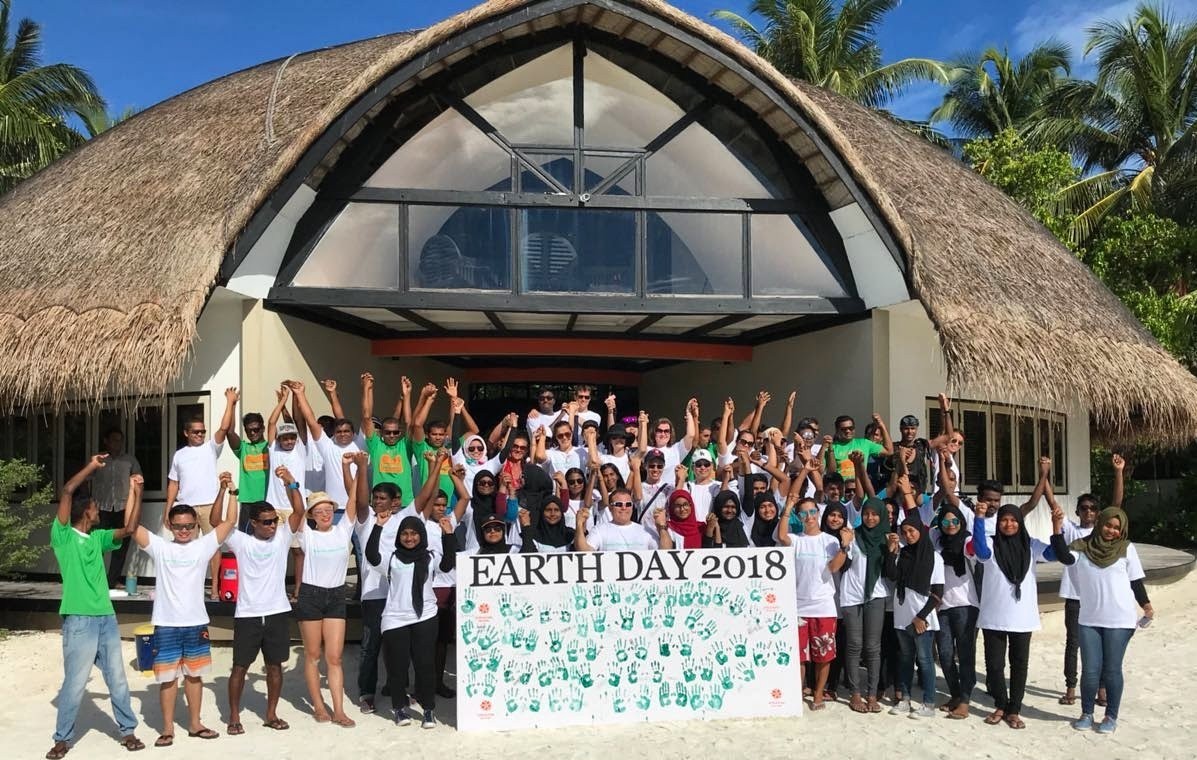
Promote |
responsible travel through a participatory approach |

Engage |
stakeholders across our value chain |
Banyan Tree endeavours to raise awareness of important global issues relating to the environment, particularly the effects of Climate Change, via our support of Global Events and Celebrations, as well as establishing our own initiatives.
Global Events and Celebrations Calendar:

International Women’s Day |

Earth Hour |

International Health Day |

Earth Day |

International Day for Biological Diversity |

World Environment Day |

World Oceans Day |

World Population Day |

World Cleanup Day |

World Tourism Day |

World Food Day |

World Children’s Day |

Own Initiatives
In 2007 we launched Greening Communities as a challenge for our properties to raise awareness of climate change by planting 2,000 trees per year. By 2016, we had planted over 427k trees, exceeding our target by 21%. We put this project on hiatus for 2016 to review outcomes; nine properties conducted their own greening in 2017.

In 2017:
15,142 trees planted
3,900 other plants planted
3,563 associates, guests and community members participating
We also conduct our own social responsibility initiative, Seedlings, for mentoring and educating children. See more below.
Reducing energy, emissions, water and waste is more than operational efficiency. Responsible consumption of resources helps reduce drivers of climate change, supporting healthy communities and ecosystems.
The tourism sector accounts for up to 5% of global emissions, and is associated with high resource consumption rates. Banyan Tree strives to reduce consumption rates through improved efficiency and adopting new technology or practices.
Energy emissions, water use and waste production are closely monitored, measuring progress against context-specific industry baselines and best practices, established in collaboration with EarthCheck.
ENERGY*
17 properties exceeded industry baseline, 11 set best practice
NEW CONSERVATION INITIATIVES
50 new initiatives, totalling 124 ongoing initiatives across 29 (71%) of our properties
EMISSIONS*
18 properties exceeded industry baseline, 13 set best practice
Lighting
Climate Control
Increased Efficiency
Behavioural Change
* Baseline and best practice estimates from location specific comparison of similar resort operations registered with EarthCheck.

Resource Monitoring has been conducted independently since 2006, with EarthCheck as our strategic partner since 2010.
EarthCheck is the leading benchmarking certification and environment management programme used by the travel and tourism industry.

Two Gold Certified Properties

Thirteen Silver Certified Properties

Six Bronze Certified Properties

Our ‘Lotus’ electric reef on Banyan Tree Vabbinfaru in the Maldives, acts as both a habitat and refuge for a diverse range of fish species, but was also uniquely designed to increase coral growth for reef restoration.
In 2017, a conservation strategy was implemented at our Labs in the Maldives, at the forefront of global climate change and with a goal to sustain natural ecosystems and human communities through science-based conservation and restoration projects.
Biological diversity, the sum of every species, plant or animal, regardless of size or function, contributes in a meaningful way towards a healthy functioning, resilient and sustainable environment.
Areas of high biodiversity, such as tropical rain forests or coral reefs, are some of the most aesthetically appealing, and often form a foundation for tourism. However, they are sensitive to natural and human disturbances, and we must be stewards and safeguard our local and global environment.

Ten properties sit within, or close proximity to, habitats of high biodiversity

A further nine properties are within 40km of national parks or reserves
A tiered approach to conservation combines long term monitoring, citizen science, and academic studies with conservation projects focusing on understanding species and habitats, and increasing awareness.
Utilising the expertise of our Labs, data generated is reported to stakeholders to support local or regional management, and direct our conservation, restoration and awareness programs.


Social responsibility is about creating value for the community, and this remains true whether they are employees, customers, community neighbours or business partners.
Businesses are in the position where they can create value more than just through job creation, and more than just providing socially responsible choices for goods and services.
Businesses have vast potential to change markets and shift traditional practices by identifying areas of aligned interest with the community to partner together and work towards the 2030 Agenda for Sustainable Development to address people, prosperity, peace and partnership through:

Central to any sustainable business and empowerment effort is how a company treats its own community of internal stakeholders: its associates/employees. Engaging across the service value chain makes good business sense:
“Employee happiness and empowerment increases productivity and longevity with a company, improves customer satisfaction and loyalty, and enhances business growth and revenue.”
Banyan Tree’s management approach extends beyond the service chain, to enhance wellbeing through diversity, satisfaction, health, safety, and welfare. Empowering associates via a sustainable workplace is the first step to external engagement and development of sustainable and resilient communities.
85%
Satisfaction
100%
Completion
Associate satisfaction is measured biannually through a formal survey as part of our commitment to improve communication and to uphold responsibility to associate wellbeing. These surveys help understand associate perceptions of the work environment, determine what is being done well and what needs to be improved, and develop action plans to make Banyan Tree a better place to work.
Benefits for associates are governed by local law, with 84% of properties issuing service charge to associates (100% of properties outside of China), 94% providing maternity support and 75% paternity leave. Figures for staff returning after maternity leave were not available for the reporting period.
Banyan Tree is committed to the health, safety and welfare of our associates, guests, visitors, partners and stakeholders. A structured and coherent approach to Enterprise Risk Management with on-site inspections provide independent unbiased assessments and recommendations. The audit and risk committee is updated quarterly with guidance from the executive group risk committee.
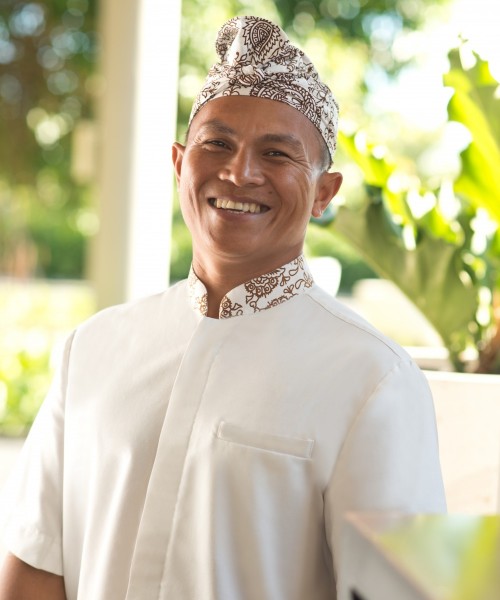

Training needs are identified through observation, guest comments, associate satisfaction surveys, audits and inspections, and biannual performance reviews. Development is supported by skills and knowledge training, individual and group learning, online and distance learning, cross exposure programs between departments locally and internationally, and through Banyan Tree’s management and spa academies.
Empowering people and providing lifelong learning and growth is a key component to Banyan Tree’s responsibility to its associates. Education is the foundation to improving people’s lives, providing pathways out of poverty and supporting sustainable development.
Investing in associate learning and development supports long term business growth. Developing and nurturing associates ensures a consistent and effective approach to personnel sourcing. In a globally aging population, retention of personnel is particularly important.
This approach is supported by a promotion strategy from part time to full time, and non-management employees, supervisors and managers moving to positions of higher responsibility. Associate service is recognised through monthly, quarterly, annual and long service awards.

Banyan Tree Management Academy (BTMA) was established in 2008 to support organisational goals through advancing people development, management excellence, and learning with integrity and meaning.
BTMA supports development of emerging leaders at all levels to meet demands of rapid growth and to sustain organisational effectiveness. Serving as a centralised training facility, BTMA provides a consistent framework for learning.
1,124 (14%)
Associates have stayed with Banyan Tree over 10 years
OVER 40%
of staff at Vabbinfaru, Bintan & Phuket over 10 years’ service
2.5%
Average monthly staff turnover
Banyan Tree Spa Academy Phuket was launched in 2001, with the mission of combating poverty and promoting gender equality, while benchmarking standards and practices to maintain a high level of consistency in service delivery
| 2017 | 2016 | 2015 | |
| New therapists trained | 121 | 124 | 114 |
| Total trained to date | 2271 | 2150 | 2026 |
| New hire training (group) | 7,7440 | 79,360 | 72,960 |

– Community Empowerment –
Supporting long term societal prosperity is central to Banyan Tree’s ability to create value for communities.

This is achieved by empowering local communities through job creation, education, supporting artisanal cooperatives, community impact initiatives, humanitarian relief and connecting travelers to local culture and heritage.
Our efforts are dynamic across the group, with context specific initiatives targeting issues identified by host communities to empower and develop long term sustainability and resilience.
Banyan Tree’s three wellness and retail segments embed sustainability as a core value in their business strategies, enabling the brands to be agents of social and economic advancement by preserving and promoting cultural heritage to create value for communities and suppliers, and supporting natural products to conserve the latent value of the global ecosystem.
These are quintessential extensions of Banyan Tree – inculcating wellness and reinterpreting heritage textiles into products for a sustainable lifestyle:
– Seedlings –
Our seedlings programs aim to nurture young people at risk of societal exclusion, providing vocational and life skills and education, and preparing them for life and work.
Launched in 2007, this two phased programme supports mentorship and scholarships:
Mentorship: Young people between the age of 12 and 18 are mentored by volunteering associates who’ve undergone mentor training.
Scholarships: Banyan Tree provides financial support for young people who face challenges in affording to continue their education.

Structured topics help guide mentor-mentee interactions to reinforce communal values along four key areas:
Academic
Language training and basic computing skills
Social
Heritage, culture, arts and crafts
Environment
Natural conservation activities
Health
Nutrition, sports and healthy lifestyle


Eat for good: Our Seedlings Café leverages Banyan Tree’s Food & Beverage expertise to create a lasting positive impact within host communities. Initial seed funding for Seedlings Café is provided by Banyan Tree Global Foundation.
– Empowering Education –
The benefits of education towards betterment of life and poverty reduction are not just for Banyan Tree’s associates, but also for our external communities.
Needs and opportunities are identified locally to support education at the primary, secondary and tertiary levels. A range of efforts have been implemented to support universal education goals through inclusive and quality education for all.
30,438
participants including:


Objective: Engage with local schools to provide equipment, infrastructure or support to assist the creation of learning environments.
Results: Support from 3,130 participants, including 412 associates and guests, benefited 1,818 students. Donations of supplies including computers, food, clothing and educational equipment were provided in Bintan, Chongqing, Mayakoba, Samui, and Tengchong. Donations from 197 guests and associates raised RMB10,000 (USD1,591) for children with autism in Tianjin, THB1.2m (USD38,316) through Children First Fun to provide food to nearly 500 Phuket based orphans and underprivileged children, and THB10,000 (USD320) in Samui to assist fire damage repairs on Banta Khun School.

Objective: Special recreational camps and classes to educate and promote safety in children and observe Children’s Day.
Results: 293 associates and guests supported 448 children with swimming lessons (Lăng Cô), English classes (Bali, Lăng Cô, Tianjin), sports (Lăng Cô), crafts (Tengchong), and fun day events for orphans (Tamouda Bay) and children with Down syndrome (Macau). 590 guests and associates were part of 4,812 participating in Children’s Day recreational sessions in Bangkok, Phuket, Lijiang and Samui.

Objective: Free language training centre converted to support long term vocational and life skills training and community enrichment.
Results: 32 learners participated in programs including English language, Chinese Culture, performance arts and general life skills in 2017, totalling 8,282 since 2007.

Objective: Provide early childhood education supporting emotional and intellectual habits and skills for independent life-long learning.
Results: 182 children aged 3 to 6 enrolled in 2017, with 21 guests and 59 associates volunteering as helpers, reading to the students. Since 2001, 3,396 students have enrolled, with 860 graduating. Graduation number may be low due to students transferring before graduation.

Objective: Reintroduce reading, a basis of self-empowerment, to local community members who may lack adequate access to books through a mobile classroom.
Results: 457 students and 31 teachers in the Phuket and Pang-Nga areas benefitted from weekly sessions on English and Sufficiency Economy Learning. Since 2014, 1,557 students and 81 teachers have benefitted.

Objective: Provide young adults with vocational training, academic development and work experience.
Results: Three PhD students and three Master’s students conducted their research in the Maldives, two undergraduate students from Maldives National University interned, and six local students conducted vocational training in hospitality operations in the Maldives. Two undergraduate students conducted environmental research in Bintan.

Objective: Accessing our competencies to develop capacity of local partners and stakeholders in science, conservation and sustainability through workshops, lectures and training.
Results: 838 participants engaged in workshops, lectures and training on sustainable tourism, data management and analysis, database design, conservation methods and environmental assessment in Bintan, Maldives, Mayakoba and Phuket.
– Community Impact –

Objective: Support and engage with communities by providing meals to underserved segments of the community, raising awareness of the SDG challenge to end hunger, improve nutrition and promote sustainable agriculture.
Results: In 2017, 17,578 meals were provided during the course of the year, with particular emphasis on World Food Day, by 34 properties and 1,117 associates and guests. Properties in Phuket provided a combined total of 11,571 meals during 2017. Since 2014, 53,361 meals have been provided. Sustainable agriculture and food sourcing awareness was conducted at Chongqing, Lăng Cô, Lijiang, and Tamouda Bay.

Objective: Support local communities through donation of goods and materials or participation in fundraising events.
Results: 7,935 participants including 2,236 associates and 336 guests from 18 properties made donations or participated in fund raising events, including support for local churches and temples (Mayakoba, Xi’an); communities and indigenous people (Mayakoba); charity runs (Bangkok, Lijiang, Phuket, Samui, Tengchong) and sports events (Phuket); exhibition to raise funds for autism (Hangzhou); Soap for Hope recycled 10.5kg of leftover soap to create 66 bars with 28 distributed to local schools with the help of 124 guests (Bintan).

Natural calamities and global crises require swift coordinated relief. It’s important that local and global communities live in safety and are resilient and prepared. We strive to reduce social and economic impact by engaging with strategic partners, and leveraging our strengths and resources in recovery efforts to increase social resilience.
In 2017, 89 associates from Cabo Marques and Mayakoba donated 100kg of supplies to assist those affected by the Central Mexico earthquake, while Banyan Tree Samui made a donation to support southern Thailand flood relief.

Objective: Enhance health care opportunities for vulnerable segments of the community.
Results: 1,998 guests, associates and community members supported: HIV Awareness (Cabo Marques); donations to the Red Cross and local hospitals (Mayakoba); pest control supplies (Tengchong); raised THB18,200 (USD580) to donate to hospitals with Laguna Phuket Triathlon (Phuket); art exhibition for young disabled artists (Lăng Cô); donated used calendars to The Christian Foundation for the Blind (Samui).

Objective: Connect to local cultures through events and activities.
Results: 6,386 people participated in cultural events in Phuket (Loy Krathong, Alms giving, Sart Duen Sib festival), Bangkok (Songkarn), Lijiang (Yi Ethnic day), Mayakoba (Summer Solstice), and Xi’an (Han Ceremony experience).
